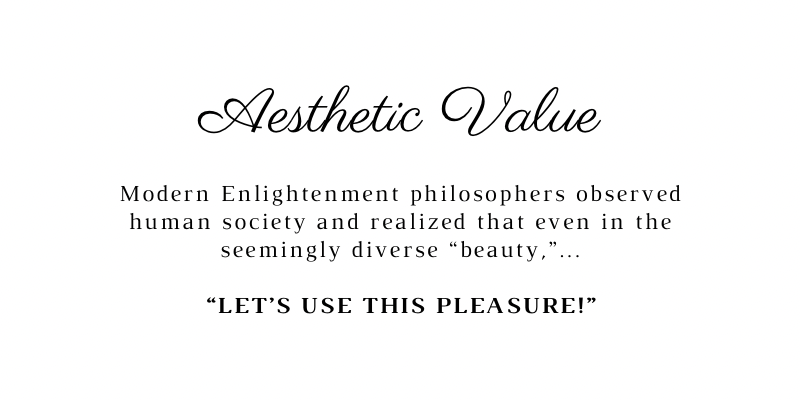영국의 보수주의의 아버지라 불리는 에드먼드 버크는 “숭고와 미…” 저서를 통해 인간의 감정에 대해 고찰을 세상에 내놓습니다. 그는 18세기 영국의 많은 철학자들이 다룬 “미학적 관념”을 선택합니다. 당시 영국의 경험론자들은 프랑스의 “이성”을 중시하는 것과는 대조적으로”하려고 했습니다.
버크는 인간의 마음은 기본적으로 세 가지 상태에 놓여있다고 말합니다. 이 주장은 경험론의 일인자인 로크가 저술한 인간오성론에서의 마음의 상태와는 다른 견해를 나타냅니다. 로크는 인간은 고통과 즐거움 둘 중 어느 한쪽의 상태에 놓여있다고 주장합니다. 그래서 즐거움이 줄어들면 고통이 늘어나는 것처럼 두 감정 관계를 표현합니다.
버크는 일상의 관찰을 통해 인간의 마음의 상태에 대해 독자들을 설득해 나갑니다. 왜냐하면 감정을 이해하기 위해서는 인간의 마음에 대해 짚고 넘어가야 했기 때문입니다. 그리고 감정이 사람들의 마음과 행동을 바꾼다는 사실도 발견합니다. 감정에 대한 이해도가 사람들의 행동 패턴을 바꿀 수 있다고 생각했을지 모릅니다. 요즘 개념으로 말하면 자신을 성장하기 위한 감정 절제 정도로 이해하면 될 듯합니다.
18세기 당시에는 심리학이라는 학문은 없었지만 사람의 마음을 연구하는 학문이 발전하기 시작합니다. 처음에는 수학과 같이 눈에 보이는 데이터가 아닌 내면의 감정을 연구하는 게 불가능하다고 생각했습니다. 하지만 사람들의 표정과 행동 패턴을 관찰하면 감정의 실체가 안 보이는 것도 아닌 것이었습니다. 사회의 관습을 존중하는 영국 사회에서는 오랜 기간 형성되어온 사람들의 패턴이 존재하고, 관습에 대한 존중을 가진 태도를 가지게 된 것도 인간의 감정에 대한 경험론적 사고방식의 결과일 수도 있습니다.
오늘날 사회를 바꾸려면 혁신적인 정책이 필요하다고 사람들은 생각합니다. 하지만 이성적 사고를 통한 이상적 정책만으로는 인간사회를 바꾸기에는 한계가 있습니다. 설령 좋은 제도가 입법되어도 시민사회에 정착되기 위해서는 시민들의 행동 패턴과 의식을 변혁하는 과정이 반드시 필요합니다. 인간 사회가 좀 더 조화롭고 개개인의 역량을 최대한 발휘할 수 있는 사회를 만들기 위해서는 사람들 사이에 매너가 필요합니다. 그리고 매너는 사람들의 감정에 대한 이해도가 향상됨에 따라 더욱 형성되기 쉽습니다. 영국에서 “매너가 사람을 만든다”라는 말이 그냥 나온 말이 아닙니다.
버크의 인간 감정에 대한 고찰은 감정에 대한 잘못된 기존의 의견에 대해 반기를 듭니다. 그리고 좋은 감정이 개개인의 행동을 바꾸고 더 나은 시민사회를 형성시키는 토대라고 믿었습니다. 보수주의적 사고는 “이성”이 아니라 “감정”을 통한 경험을 존중합니다.
Reflection on “The Sublime and Beautiful”-The Power that Moves People, Emotions
Edmund Burke, known as the father of conservatism, presents his reflections on human emotions in his book “The Sublime and Beautiful.” He chose to focus on the “aesthetic notions” discussed by many philosophers in 18th-century England. Unlike the French emphasis on “reason,” English empiricists at the time sought to understand humans through “emotion.”
Burke states that the human mind is fundamentally in one of three states: “pain,” “indifference,” and “pleasure.” He posits that humans are driven by these three emotions. This view contrasts with John Locke’s perspective in his “An Essay Concerning Human Understanding,” where Locke argues that humans are either in a state of pain or pleasure. He suggests that as pleasure decreases, pain increases, and vice versa.
Burke persuades his readers about the state of the human mind through everyday observations. To understand emotions, he believed it was essential to address the human mind. He also discovered that emotions change people’s minds and actions. Burke might have thought that understanding emotions could alter people’s behavior patterns. In today’s terms, this can be understood as emotional regulation for personal growth.
Although psychology as a discipline did not exist in the 18th century, the study of the mind began to develop. While studying emotions might seem impossible without visible numbers, emotions are not entirely invisible, as they can be observed through people’s expressions and behavior patterns. The long-standing respect for social customs in English society and the resulting patterns might be a product of empiricist thinking about human emotions.
Today, people think that innovative policies are necessary to change society. However, ideal policies based solely on rational thought have limitations in transforming human society. Even if good laws are enacted, for them to take root in civil society, it is crucial to transform citizens’ behavior patterns and consciousness. To create a more harmonious society where individuals can fully utilize their abilities, manners among people are essential. Manners are easier to develop as understanding of emotions improves. The saying “manners make the man” in England did not emerge without reason.
Burke’s reflections on human emotions challenge previous misconceptions about emotions. He believed that positive emotions could change individual behavior and form a better civil society. Conservative thought respects experiences through “emotion” rather than “reason.”



